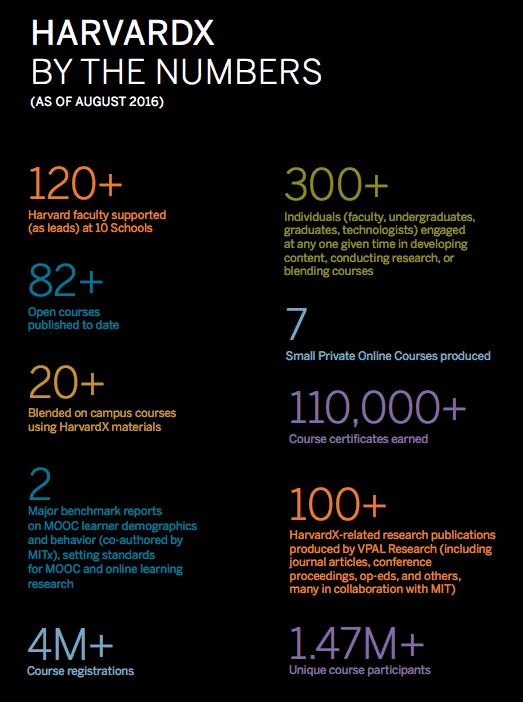Harvard and the Rise of a Digital Ivy League
There’s a new elite forming in higher education: a group of universities that have online enrollments reaching into the millions.
There’s a new elite forming in higher education: a group of universities that have online enrollments reaching into the millions, and the global reach of which includes learners of every age, profession, income level, and expertise (from high school students in Chicago to the retired psychologist in rural Japan, or the project manager in Cape Town).
The digital Ivy League includes MIT (more than four million enrollments) and the University of Pennsylvania (more than five million enrollments). It also includes the University of Michigan, Delft University of Technology, and a few Australian universities.
Another university that has been particularly bold with its online learning efforts is Harvard University. Harvard is considered a paragon of on-campus higher education; it has also become an online learning powerhouse with over 80 massive open online courses (MOOCs) taught by more than 120 faculty, and over 4.5 million enrollments from over 1.5 million unique course participants in 193 countries. Harvard also co-founded the MOOC platform edX.

HarvardX by the numbers. src: HarvardX: Year in Review 2015–2016.
Hundreds of faculty, students, and staff have been involved with HarvardX, the university’s online learning division. Harvard researchers continuously analyze the motivations and behaviors of its MOOC learners. I spoke with Peter Bol, Harvard’s Vice Provost for Advances in Learning, and he says that most learners that have enrolled in its MOOCs are primarily seeking personal enrichment. According to Bol, one of Harvard’s current goals is to offer a high-quality liberal arts education to learners everywhere.
Over twenty Harvard on-campus courses now use a blended approach
Another goal is reusing content developed for online courses to improve in-person classroom instruction (both at Harvard and beyond). Over twenty Harvard on-campus courses now use a blended approach: students watch recorded lectures at home, and spend class / instructor time asking questions, working with other students, reflecting, and applying what they learned from the lectures. HarvardX content is also being used to prepare new students before they arrive on-campus.
Around a third of HarvardX MOOC learners identify as teachers
Around a third of HarvardX MOOC learners identify as teachers, so Harvard has been developing tools to help teachers incorporate and effectively use MOOC content in their classrooms. The university is also experimenting with offering its MOOCs (along with other support) in community centers.
I also spoke with HarvardX Faculty Director Robert A. Lue about HarvardXPLUS, which offers online courses with enrollment capped in the hundreds. In that program, learners are grouped based on certain characteristics and each learner has access to special tools to interact with the content (e.g. video annotation tools). Harvard has also begun offering its very popular CS50 MOOC in a new virtual reality format, allowing learners to feel like they’re sitting inside the lecture hall.
Many people are skeptical (or cynical) of the value of MOOCs and other digital learning innovations. My suggestion is to remain skeptical but recognize that these innovations are already reaching tens of millions of learners all over the world.






Muvaffak GOZAYDIN
Harvard is great for providing online . But Harvard and other top universities must provide more online courses for credits toward degrees . One can take 50 % online courses for credits toward degrees at low cost such as $ 300-400 per 3-credit couıse lasting 10-15 weeks . Their diploma can be like Harvard EXTENTİON Diploma . No problem . We, employers accept those as good as close to real Harvard diploma surely much better than second class colleges diplomas . PLEASE THINK ABOUT IT .
Oscar Eduardo
True, i prefer that diploma and accept that as good so much better than second class colleges diplomas at my country.
VlaGood
These big numbers of online enrollment sound very inspiring. But all those MOOCs are just one-size-fits-all video lectures, which are proven to be not effective. Completion rate is very low. Meanwhile a growing number of online Adaptive Platforms for Personalized Education makes very effective education come true. Such Platforms are not crated equal, there are a lot of hype due to high demand. So make a right choice. I can recommend what I know best http://ilms.cloudapp.net/itutorsoft/.Good luck!
Muvaffak GOZAYDIN
VlaGood
Technology never stops . Today online tomorrow as you say personalised learning an d more . One day when you swallow a red pill you will learn all mathematics in the world . Ha ha ha .
VlaGood
One day when you swallow a green pill you will build a house, blue pill and you will get rich, etc. Did I get your idea right?
Muvaffak GOZAYDIN
VlaGood But you will not see it . You will not live that long . Sorry.
Muvaffak GOZAYDIN
No green pill for math,
red pill for psychology,
blue pill for sociology
yellow pill for marketing
disqus_5T2jXBEN10
The combined tax free endowment of these “Ivy Colleges” is around $100B, yes, Billion dollars, and growing they can afford to help the “less” fortunate
Muvaffak GOZAYDIN
You see, how people are interested in education .
That is the reason education is at lowest level in USA . People have no interest in education . Only rich goes to Harvard and MIt and their graduates manage the country . So never complain . You deserve it .
Muvaffak GOZAYDIN
Harvard, MIT, Stanford, Princeton, Berkeley, U ni of Penns can save the USA by providing online degree programs same as oncampus programs at low prices like Georgia Tech , 85 % reduced from normal price . Then they can provide the 10 million highly talented graduates who can save the USA from all the enemies and nmatuıral disasters . Pray God , let them do it . We do not need second class colleges anymore their only aim is to make money .